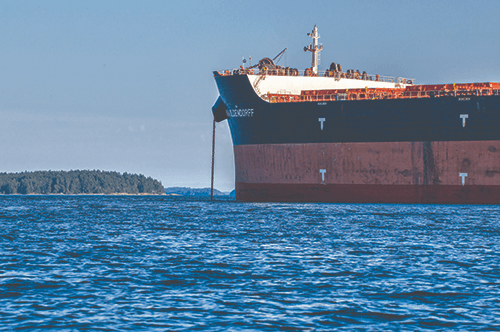Stakeholders and operators in the maritime sector have lent their support to the decision by the Nigerian Ports Authority (NPA) to cancel the secure anchorage area operated by a private security firm, OMSL in conjunction with the Nigerian Navy to provide security to ships coming to Apapa and Tin can Island Ports in Lagos.
Ships paid between $2,000 and $5,000 per day to stay within the so-called secure anchorage area.
However, citing threat to national security and the high cost of doing business at the nation’s seaports, the NPA recent said it had notified the Nigeria Navy to dismantle the anchorage area, which OMSL has operating on its behalf since 2014.
NPA had also in a letter to the National Assembly insisted that the delineation of an anchorage area and the publication of Notices to Mariners on vessels calling at Nigerian ports as regard the port limits and approaches is its (NPA’s) responsibility, and not that of the Nigerian Maritime Administration and Safety Agency (NIMASA).
The stakeholders who spoke in separate interviews with SHIPS & PORTS said the NPA has the statutory right to cancel the controversial secure anchorage area.
President, Nigerian Association of Master Mariners, Capt. Tajudeen Alao, described the idea of the secured anchorage area as a misnomer, stating that only NPA has the power to designate anchorage areas within port limit.
He said NIMASA already has an annual levy on ships calling Nigerian ports wondering why the Navy will have to subject shipo wners to another levy for the same security purpose.
“Firstly, the idea of secured anchorage area is a misnomer in the first place. What I know globally is approved anchorage for short and long stay and so marked on the chart and no extra levy is imposed for that.
“Secondly, Navy has no power to create one and too badly to be collecting daily levy. Only NPA has the power to designate anchorage area within port limit while NIMASA must be informed, which will then pass the information to the International Maritime Organisation (IMO)/International Hydrographic Organization (IHO) for marking on admiralty charts.
“Finally, NIMASA already has annual security levies on all ships calling Nigerian waters. Why double or multiple levies? In addition, NIMASA has Maritime Guard Command as part of its department and also supports Navy financially with platforms and this practice is unknown to shipping practice worldwide,” he said.
On his part, the Chairman of Nigerian Ports Consultative Council (NPCC), Otunba Folarin, said given that the nation’s maritime security is a delicate one, no agency should assume roles not assigned to it under the country’s constitution.
He said, “This issue is very serious for the economy and delicate for Nigeria’s maritime security and not only on cargo ship. The constitution of the country should be put into consideration because laws and the acts are to be obeyed and it is not right for anybody or groups to jump in and be taking roles not assigned to them either by the constitution or Acts of Parliament. If not, you can take the place of the Governor of Lagos State and give the reason that he is not fixing the potholes on Lagos roads.”
Also speaking, the Managing Director of Seagate Global services Limited, Wilson Arikpo, said, “The Nigerian Navy, NIMASA and Marine Police have the statutory responsibility of ensuring safe and secure Nigeria territorial waters. I am aware that the NPA bought some patrol security boats to aid the Nigerian Navy in the fight against insecurity; so should we not have our entire maritime space effectively safe and secure without creating a designated area, akin to paying security fees for safety, or be dealt with?
“It follows that only vessels in the Secured Anchorage Area (SAA) are guaranteed safety and security because of the extra money they can afford. I do not know whether any percentage goes to the government at all, but the people are already overburdened with taxes and it has added to create more difficulty in doing business in Nigeria. If the coordinates I have are correct, NPA is within its rights to cancel the SAA because it is located within her authorized control area [Centre Point 06 17’30N/003 12’00E], which should be strictly under the management and control of the NPA.”

